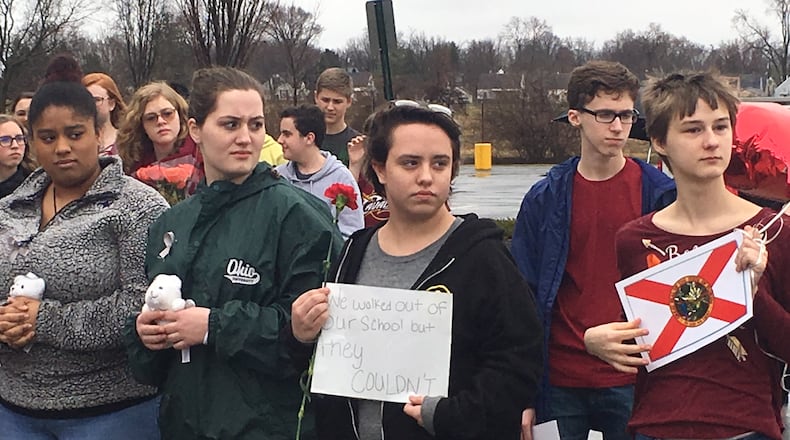The full letter appears at the bottom of this story.
"As students plan walkouts to press for changes in social policy, please bear firmly in mind: The Constitution forbids disciplining students more harshly for politically motivated conduct," ACLU of Ohio Executive Director J. Bennett Guess wrote. "The ACLU of Ohio may intervene if a student who leaves school as an act of political protest faces more severe punishment because of their political beliefs."
MORE COVERAGE:
» Can students get in trouble for #NeverAgain school walkouts?
» Hundreds of local students walk out, more planned
At schools across the state — including here in southwest Ohio — students have organized walkouts with a variety of intentions, all sparked by the slaughter of 17 people at the Parlkand, Fla., high school.
Some of the walkouts are geared expressly toward more strict gun control, while others are aimed at memorializing the dead in as non-political a manner as possible.
In 1969, the U.S. Supreme Court ruled in Tinker v. Des Moines that neither students nor teachers “shed their constitutional rights to freedom of speech or expression at the schoolhouse gate,” but also recognized the need to prevent substantial disruption to the educational process.
Earlier this month, the Dayton Daily News used Ohio’s public records law to reveal how area superintendents debated whether or not students should be punished for walkouts.
Troy Superintendent Eric Herman said he would not punish Troy students who participate peacefully in walkouts, instead telling school principals not to physically stop the students and “escort them out if need be — supervise them — and return them into the buildings.”
» Emails show local schools wrestling with student protests after Florida shooting
Other schools decided discipline would need to be enforced should students choose to walk out. Miami Valley Career Technology Center Superintendent Nick Weldy told the Daily News he decided the district would enforce discipline measures.
The ACLU letter encourages school officials to “choose their most appropriate response to student activism.”
“This is why we are asking that, instead of focusing on discipline and punishment, school officials should seize this as a teachable moment by nurturing students’ commitment to social action by removing barriers to their participation,” Guess wrote, later adding, “Public schools are essential in educating young people about democracy, and that includes their role in enacting it.”
Read more coverage of school safety issues:
» Fairborn police: Schools won’t release records about arrested 12-year-old
» After school threats, Dayton-area children face next step: Court
About the Author
